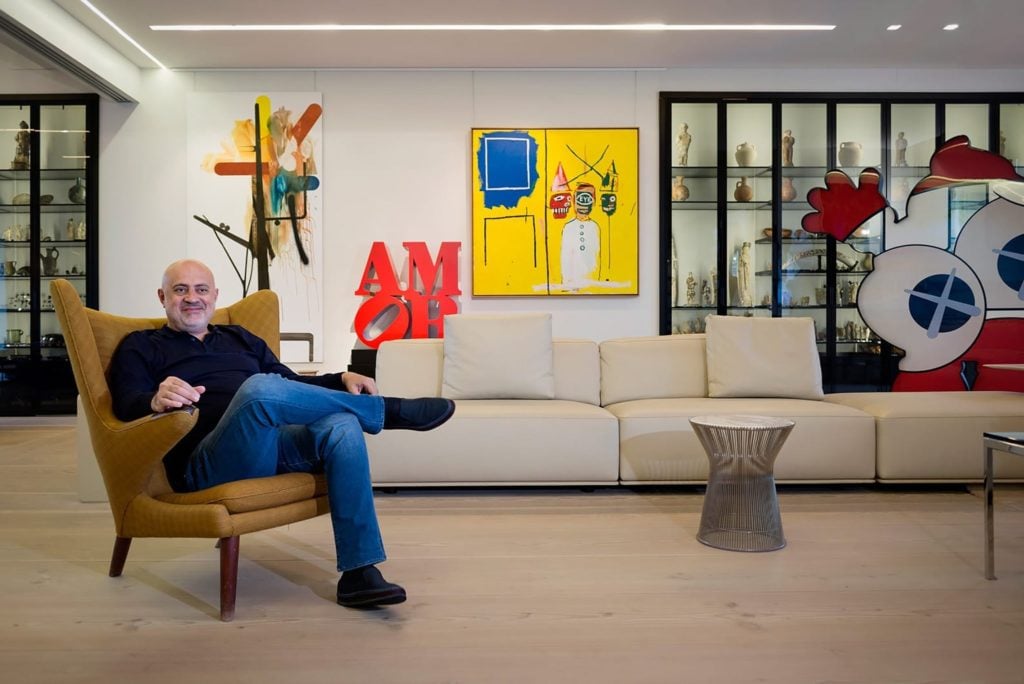Art World
The US Treasury Department Sanctioned Dealer Nazem Ahmed for Allegedly Using His Gallery to Fund a Terrorist Group
The Lebanese collector, fond of works by Warhol and Picasso, is under fire from the Treasury Department.

The Lebanese collector, fond of works by Warhol and Picasso, is under fire from the Treasury Department.

Caroline Elbaor

In a press release issued Friday by the Department of the Treasury, the US government announced sanctions on diamond dealer and prominent art collector Nazem Said Ahmad, in an effort to fight money-laundering that supports Hezbollah—the Lebanon-based political faction categorized as a terrorist movement by American officials.
The government’s statement asserts that Ahmad, whose links to Hezbollah date as far back as 2001, established the Artual Gallery in Beirut as a front to “launder substantial amounts of money bound for the terrorist group,” for which he is a “significant financier,” having at one point even “personally” provided funds to Hezbollah Secretary-General Hassan Nasrallah.
Despite his alleged role adjacent to a designated terrorist organization, the businessman has also managed to carve out a second reputation for himself: that of a notable art collector for nearly 30 years, whose collection includes works by Andy Warhol, Pablo Picasso, and Jean-Michel Basquiat (with the full bounty worth, per the Treasury, “tens of millions of dollars”).
A profile of Ahmad published earlier this year (and later removed) by the online magazine Selections Arts included an exhaustive list of big-name contemporary artists whose work he proudly owns, including the likes of Antony Gormley, Barbara Kruger, Gerhard Richter, Yayoi Kusama, Lucio Fontana, and Ai Weiwei. During the interview, he reflected upon his first-ever purchase: a work on paper by Pablo Picasso, which he bought in the early 1990s.
According to officials, in addition to using his gallery to conceal money-laundering, Ahmad also used his extensive collection to advance his illicit activities by storing “some of his personal funds in high-value art in a pre-emptive attempt to mitigate the effects of U.S. sanctions.”
Ahmad has officially been considered a “major Hezbollah financial donor” by US agents since late 2016, with the sanctions coming as a result of years-long investigations conducted in collaboration with Homeland Security and the Drug Enforcement Administration.
The move is part of the Trump administration’s ongoing fight against terrorist financing, with Friday’s statement also naming another man, Saleh Assi, as the subject of sanctions. “This Administration will continue to take action against Hizballah financiers like Nazem Said Ahmad and Saleh Assi,” said Secretary of the Treasury Steven Mnuchin in a statement, using the alternate spelling of the group’s name, “who have used money laundering and tax evasion schemes to fund terrorist plots and finance their own lavish lifestyles as the Lebanese people suffer.”
Deputy Secretary Justin G. Muzinich also added a comment directed specifically towards “art and luxury goods dealers,” warning them to “be on alert to the schemes” crafted by criminals such as Ahmad.
Artnet News did not receive a response to a request for comment from Ahmad via the Artual Gallery. However, Ahmad is apparently still active on social media: Earlier today, he uploaded three posts to his Instagram account, two of which are portraits of Andy Warhol and Jean-Michel Basquiat.